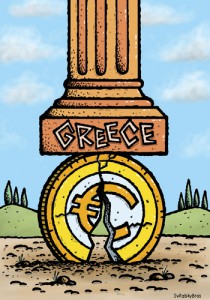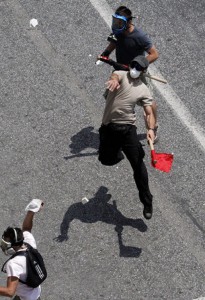It is a question I have to answer almost on a daily basis for quite a while. Everywhere I go, as soon as people find out I am Greek, they ask: what is going on with Greece?
 |
| There is strong pro-European sentiment in Greece, despite the trouble. |
In case you have lived under a rock for the last two years, Europe is in trouble, and, apparently, it’s the Greeks’ fault. The debt crisis, which has engulfed Ireland and Portugal and today threatens to spread to Italy and Spain, is spearheaded by Greece and has put the very existence of the Euro, and even the European Union, in danger. How does a tiny and insignificant country in a corner of the Mediterranean end up jeoperdising the future of not only the European monetary union, but also the international markets?
It is often easy to forget the teachings of history, but the fact is that this is not the first time we have been in similar positions. Greece has been at the forefront of major European developments for almost 200 years. We Greeks often think that Greece is the centre of the world. Non-Greeks often believe that the last time Greece mattered was 2500 years ago. I think a much better perspective is this: we are Europe’s testing ground; if you want to know what lies ahead, you will do well to look towards Athens first. In other words, it is not a coincidence that the spreading debt crisis and the social unrest that comes with it have a Greek epicentre.
 |
| Can the Euro survive Greece? |
Still, it is absolutely true that Greece has been living way beyond its means for at least the last 20 or 30 years. Greece has been borrowing heavily for quite some time (not that this is a practice that is any different than the one the majority of world countries have been following of course), while the government’s income has always been heavily curtailed by wide-spread tax evasion, bad management, and lack of proper investments that would take advantage of the country’s natural resources. For a time, the situation was sustainable due to the fiscal help provided by EU structural funds, investments related to the 2004 Olympic Games in Athens and, allegedly, “clever” book-keeping (the fact that this was later denied by both the Greek government, and our partners-in-crime, Goldman Sachs, leads me to believe that it’s probably true). The perilous route of our economy was finally derailed when the international financial crisis of 2008 struck. As Warren Buffett famously said, “it’s only when the tide goes out that you learn who’s been swimming naked”. And Greece has been skinny dipping for some time.
And then there is the gigantic problem of corruption. It is difficult to describe accurately the rampant spread of malfeasance and nepotism in Greece, especially to someone who is not familiar with the system from the inside. I am actually really conflicted about writing on this issue, because it’s impossible to be fair; it is very easy to both exaggerate it and understate it. There is a wide-spread notion in Europe that finds it preposterous that Greeks are demonstrating and striking on a weekly basis, wasting public funds, after years of taking advantage of a corrupt public sector to enjoy large salaries and 3-day working weeks. But this view fails to consider the silent masses, the rest of the population that did NOT profiteer, or try to take advantage of the system, never avoided taxes, and who are now paying the steepest price for the debt crisis.
Financial mismanagement and favouritism have created an unsustainable economic model. The Greek economy and society completely depended (and still do to a very large degree, because the reforms and austerity measures are heavily resisted by the corrupt system) on the public sector. For decades, the state functioned as a mediator between foreign funds and the Greek people. Borrowing and funds allocated for investment and development would go either to guaranteeing the support for the ruling party through the constant enlargement of the public sector, or to a select group of privileged entrepreneurs. The result: a gigantic, counter-productive, politically polarised and profligate public sector, and a private sector almost completely dependent on the state, surviving as supplier of the public sector and/or through getting involved in construction. Big business in Greece depends on a special relation with the state, or special privileges that they have been awarded by governments. Small businesses mostly survive through profiteering and tax evasion.
The problem goes deeper than finance. One of the biggest problems with the breadth of corruption is that it leads to apathy and social decay. An intimate knowledge of Greek reality reveals to anyone who will stand and take notice that what is going on in Greece, and what has been going on for decades before the consequences finally became evident, is not a debt crisis; this is just the symptom. It is a moral and ethical crisis. It is a moral collapse, which has come about because of our geopolitical situation, our specific historic circumstances, our characteristic Mediterranean temperament, and our culture which, uniquely, stands half-way between Europe and the Middle East.
 |
| Strikes and riots are a staple of everyday Greek life. |
It is a situation I do not condone, but I can understand how people get drugged into. It is not easy to be the knight in shining armour when everyone around you, from the local councilors to ministers, from the corner-shop owners to bishops, from clerks to lawyers to judges, is involved in some way in the corruption. Greek society reached a point a decade or two ago, when the one who did not “use his connections”, “go with the flow”, “grease the hinges” (the one who did not steal, profiteer, embezzle or otherwise take advantage of the system for financial or personal gain, to do away with the metaphors), suddenly found himself on the opposite side of the fence: he was the one who was considered the outlier, the stearer, the fool. The current debt crisis is only the natural extension of that. It is also why the majority of Greeks, the silent masses, the ones who are not on TV demonstrating and creating havoc on the streets on a regular basis, are in fact pretty much stoic in dealing with the situation. We know very well that, at some level, either by our direct participation, or even simply by our indifference, we have all been part of the problem.
My only hope is that we can also be part of the solution.


